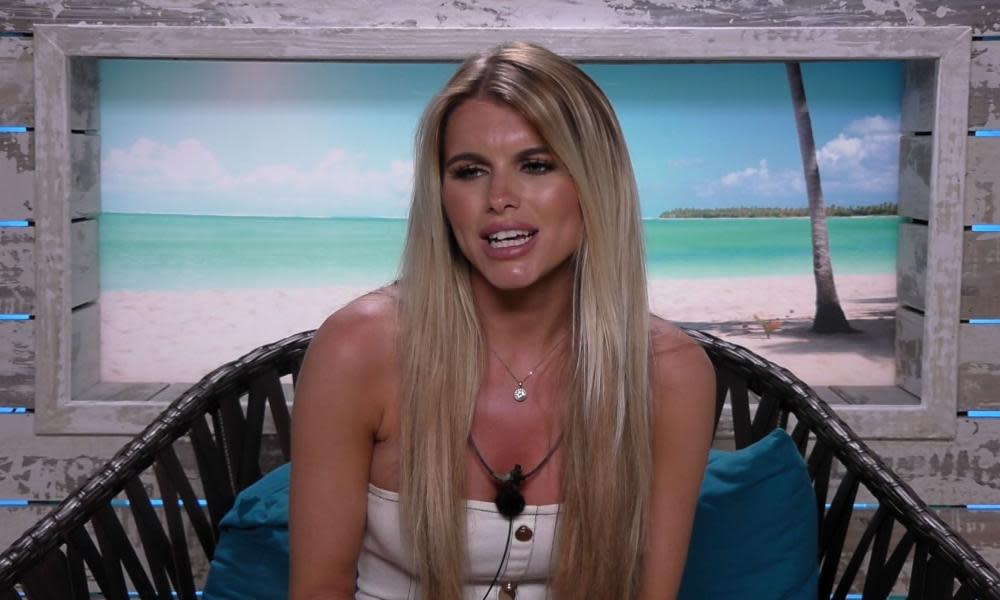Love Island is a Rorschach test: see what you want to see

On Friday, an evicted Love Island contestant appeared on Daily Politics alongside Nigel Farage and Alastair Campbell to talk about Brexit. Hayley Hughes, from Liverpool, has achieved fame and notoriety beyond the show’s traditional audience for not knowing what Brexit means, before asking on the reality TV series whether it will lead to fewer trees in the UK. But her appearance on Daily Politics had more to do with the fact that, for those in Westminster not preoccupied with the World Cup, a not insignificant proportion of the political class is obsessed with another summer knockout tournament: the grafting, coupling up and mugging off of a group of suntanned under-30s in a villa in Mallorca.
This obsession is not confined to Westminster: this year’s Love Island is bringing in record audiences for ITV2. Its opening programme was watched by a peak of 3.4 million viewers, surpassing the audience for last year’s final by a million and making it the highest-ever for the channel. It is becoming such a hit that people are starting to look for hidden meanings behind its popularity. Love Island has turned into a Rorschach test, revealing to the viewer what they want to see, only maybe with a splodge of Fake Bake fake tan instead of an inkblot.
Sir Michael Wilshaw, the former head of Ofsted, sees the Bafta-winning series as an “appalling” indictment of England’s education system. He may have been talking about Hughes’s comments about Brexit, although who can blame her for not really knowing what’s going on when the negotiations have been so tortuous? He may have watched long enough to hear Hughes confuse the concept of a city, county and country, and wonder whether Spain is part of the UK. Or perhaps he couldn’t follow what Dani, the daughter of actor Danny Dyer, meant when she said: “He mugged you off but you mugged him off harder.” But then Sir Michael would also have to admit he knows Alex is an A&E doctor and Zara is a policy adviser at the Department for Education.
For feminist MPs such as Jess Phillips, Lucy Powell and Stella Creasy there are plenty of moments of female empowerment
For feminist MPs such as Jess Phillips, Lucy Powell and Stella Creasy, some of Love Island’s biggest fans in Westminster, there are plenty of moments of female empowerment, most notably when Adam, the villa love rat, is called out twice by his partner Rosie for his philandering. It was after the second of these confrontations, when Adam smirked at Rosie for getting upset and blamed her for his bad behaviour, that Women’s Aid issued a statement highlighting emotionally abusive behaviour and gaslighting.
Rosie’s parting shot to Adam – “Enjoy the next bombshell that walks in because this one’s done” – won her an army of female fans. Adam’s bad behaviour was uncomfortable to watch yet this was not, as some have suggested, the producers normalising emotional abuse, but, rather, them exposing it. Everyone, including Rosie, could see what it was. For the audience, Adam is the No 1 hate figure who will be voted out at the next opportunity.
No one can possibly claim that Love Island holds a mirror up to our society, unless that society is largely white, heterosexual and does two hours in the gym every morning with 36kg kettlebells. If it is anything, it is the walking, talking version of the Instagram influencer class. There are problems with a format that hothouses sexual attraction, often at the expense of real people’s feelings. While the islanders have devoted many hours to finding Alex a woman to couple up with, nobody in the villa seemed to care that Samira, the only black woman on the show, was also without a romantic partner – until she was chosen by newcomer Sam. One of the contestants, Niall, had to leave the show for personal reasons within days of arriving in the villa. There are psychologists, as well as first aiders, on standby.
But we shouldn’t overanalyse Love Island as an excuse to watch it. Maybe the inkblot is just an inkblot. Anyone can pretend to be only interested in watching Inspector Montalbano on BBC Four. It’s harder to openly admit that the highlight of your evening is someone sitting up from their sunlounger to declare: “I’ve got a text!” or to wonder why Dani dries her eyelashes with a hairdryer. Maybe it is best to treat Love Island like a holiday romance: don’t take it too seriously, just enjoy it while it lasts.

 Yahoo News
Yahoo News 
